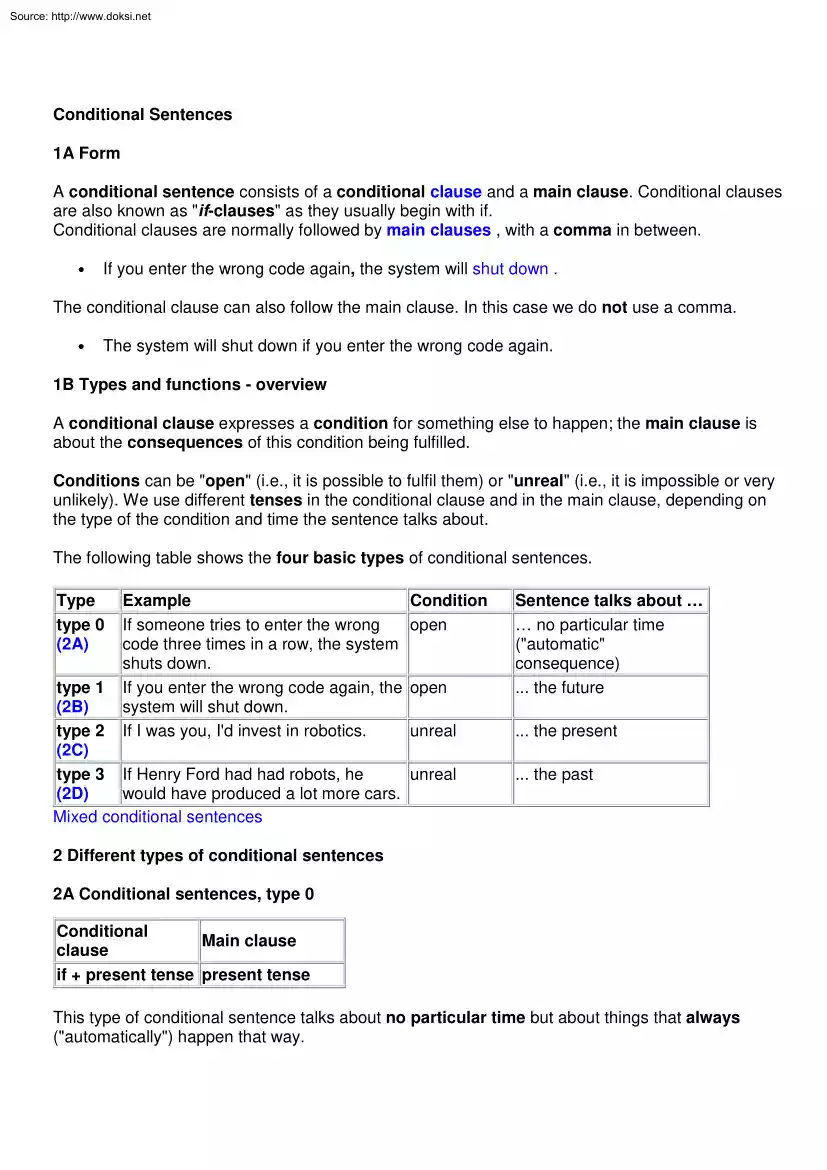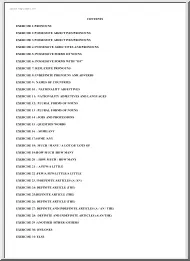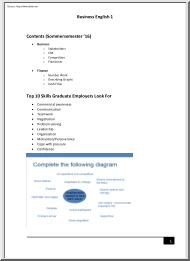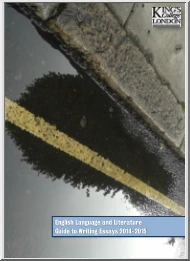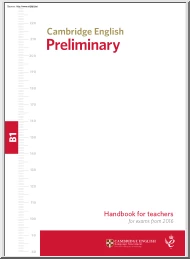Comments
No comments yet. You can be the first!
Content extract
Source: http://www.doksinet Conditional Sentences 1A Form A conditional sentence consists of a conditional clause and a main clause. Conditional clauses are also known as "if-clauses" as they usually begin with if. Conditional clauses are normally followed by main clauses , with a comma in between. • If you enter the wrong code again, the system will shut down . The conditional clause can also follow the main clause. In this case we do not use a comma • The system will shut down if you enter the wrong code again. 1B Types and functions - overview A conditional clause expresses a condition for something else to happen; the main clause is about the consequences of this condition being fulfilled. Conditions can be "open" (i.e, it is possible to fulfil them) or "unreal" (ie, it is impossible or very unlikely). We use different tenses in the conditional clause and in the main clause, depending on the type of the condition and time the sentence talks
about. The following table shows the four basic types of conditional sentences. Type type 0 (2A) Example Condition If someone tries to enter the wrong open code three times in a row, the system shuts down. If you enter the wrong code again, the open system will shut down. If I was you, I'd invest in robotics. unreal type 1 (2B) type 2 (2C) unreal type 3 If Henry Ford had had robots, he (2D) would have produced a lot more cars. Mixed conditional sentences Sentence talks about no particular time ("automatic" consequence) . the future . the present . the past 2 Different types of conditional sentences 2A Conditional sentences, type 0 Conditional Main clause clause if + present tense present tense This type of conditional sentence talks about no particular time but about things that always ("automatically") happen that way. Source: http://www.doksinet • • If someone tries to enter the wrong code three times in a row, the system shuts down. (This
always happens because the system has been set up that way.) If a private pension fund goes bankrupt, the clients have no guaranteed right to compensation. (This is generally the case as the law does not regulate compensation.) We can also use when instead of if with this type. • When someone tries to enter the wrong code three times in a row, the system shuts down. (Every time/whenever someone tries to do that, the system reacts in this way.) Basic types of conditional sentences 2B Conditional sentences, type 1 Conditional clause if + present tense Main clause future tense (will/may/might/could + infinitive) Future tense-form This type of conditional sentence talks about the present. We use it if the condition in the if-clause is open (i.e, if it is possible to fulfil) • • If you enter the wrong code again, the system will shut down. (It is possible that the system will shut down - all you have to do is try to enter the wrong code once more.) Won't transport be much
more expensive if goods are produced in space? (There will probably be space factories sooner or later; if this is really true, their products will have to be shipped to Earth by space shuttle, which is expensive.) 2B-1 Will in if-clauses We can sometimes use will in if-clauses. . to express willingness: • If the computer won't start, I guess we'll have to call the service people. (ie, if it refuses to start) . or for polite requests: • If you'll just wait here for a moment, someone will help you right away. Basic types of conditional sentences WILL for offers, promises and requests 2C Conditional sentences, type 2 Conditional clause Main clause if + past tense conditional 1 Source: http://www.doksinet (Sometimes were is used instead of was; this is more formal.) (would / could / might + infinitive) This type of conditional sentence talks about the present. We use it if the condition in the if-clause is unreal (i.e, if it is impossible to fulfil) •
• If I was you, I'd invest in robotics - it's the technology of the future. OR: If I were you, I would invest in robotics. (more formal) (Of course this can never happen because I can never be you.) We could produce very pure crystals if we had a space factory. (But we don't have a space factory, so we can't produce such pure crystals.) Other uses of MIGHT and COULD 2C-1 type 2 for future conditions We can also use type 2 to talk about something that could theoretically happen in the future. We do this if we want to signal distance, e.g because we don't necessarily believe it could actually happen. • If computers ever produced decent translations, many translators would be out of a job. (But this possibility seems very distant and unlikely to me.) By using type 1 instead, we leave this possibility wide open: • If computers ever produce decent translations, many translators will be out of a job. (Maybe this will happen, but maybe it won't.)
Basic types of conditional sentences 2D Conditional sentences, type 3 Conditional clause if + past perfect tense (had + past participle) Main clause conditional 2 (would / could / might + have + past participle) This type of conditional sentence talks about the past. We use it if the if-clause is unreal (ie, if it is impossible to fulfil). • • If Henry Ford had had robots, he would have produced a lot more cars. (But Henry Ford didn't have robots, so he didn't produce more cars.) If women hadn't been admitted to universities, Marie Curie might not have done most of her ground-breaking research. (But fortunately the universities were opened to women and Marie Curie was able to do her research.) Other uses of MIGHT HAVE and COULD HAVE Basic types of conditional sentences Source: http://www.doksinet 2E Mixed conditional sentences Several other combinations of tenses besides Types 0, 1, 2 and 3 are also possible. There are no special "rules" for these as
it is mainly a question of logic and of what we are trying to say. 2E-1 Unreal conditions: combinations of types 2 and 3 • We'd be in much better shape if Emma hadn't left the design team. (Emma left the team in the past and we're in bad shape now - this is a combination of Types 2 and 3.) 2E-2 Open conditions: any combination of tenses that makes sense • • • Well, if you've lost your key card, they're not going to give you a new one. (I know that my colleague has lost her key card and I think I know how the company will react.) We'll need a lot more wine if we're inviting all our customers to the launch party. (We've arranged to invite all our customers; if we don't change our mind about this, we'll have to get more wine.) If Josie sent the parcel by EMS yesterday, it must be in the Paris office by now. (We don't know whether she actually sent it by EMS - this is an open condition in the past.) Basic types of
conditional sentences 3 Alternative and similar constructions 3A Conditional clauses without if Instead of using if, we can also start a conditional clause with should (type 2) or had (type 3). This is more formal; it is sometimes used in business letters. • • Should you have any further questions, please contact my assistant, who will be happy to help you. (i.e, if you have any further questions - type 2) Had you paid your bill on time, we would not have been forced to place the matter in the hands of our lawyer. (i.e, if you had paid your bill on time - type 3) Basic types of conditional sentences 3B Unless Unless means if not. • We'll never get this machine assembled on time unless headquarters send us another technician. (i.e, if headquarters don't send us another technician) We cannot use unless if we put an unreal condition before the main clause. Source: http://www.doksinet • • • WRONG:Unless he'd paid me I would have sued him. I would have
sued him unless he'd paid me. OR: If he hadn't paid me, I would have sued him. We do not use unless when we are talking about feelings which would result from something not happening. • • WRONG:I'll be so disappointed unless we get this contract. I'll be so disappointed if we don't get this contract. Basic types of conditional sentences 3C As long as, provided/providing, on condition that; and We can use any of these to replace if. Provided/providing is more formal than as long as; on condition that is even more formal. The construction with and + future tense is fairly informal • • • We are willing to discuss a discount provided/providing (that) / on condition that you consider increasing the volume of your order. (i.e, if you consider ordering more) You can borrow any of these laptops as long as you sign for it. (i.e, if you sign for it) Sign here and I'll get you a laptop. (I'll get you a laptop if you sign here.) Basic types of
conditional sentences 3D If and when We use when if we do not want to express a condition but to refer to the time when something will happen. • • When the shipment arrives, will you sign the papers, please? (I know the shipment is coming.) BUT: If the shipment arrives, will you sign the papers, please? (The shipment may or may not come, I don't know.) WHEN in conditional sentences Basic types of conditional sentences 3E If and in case If and in case do not mean the same thing. • • Our sales reps get traveller's cheques in case they need more money than usual. (We always give our sales reps traveller's cheques because it is possible they will need more money than planned.) Our sales reps get traveller's cheques if they need more money than usual. Source: http://www.doksinet (We only give them cheques if they need more money.) Basic types of conditional sentences 4 Would without conditions We can also use the modal verb wouldoutside conditional
sentences. We often do this to sound less direct and more polite. 4A Polite requests and statements • • Would you pass me the cordless phone, please? (More polite than Will you pass me the phone? or Pass me the phone, please.) I wouldn't agree with that. (More polite than I don't agree.) Overview of modal verbs 4B Would like and would rather We can use both of these expressions to say politely what we want. • • • • • I'd like some cocoa on my cappuccino, please. (More polite than I want some cocoa.) BUT: I like cocoa on my cappuccino. (I generally like it, I'm not asking for any now.) I'd rather pay cash than by credit card. (I'd prefer to pay cash.) I'd rather not discuss this matter in front of clients. (I'd prefer not to do this.) I'd rather you went outside to smoke. (I'd prefer it if you went outside.) I'd rather you didn't smoke in here. (I'd prefer it if you didn't do it.) Conditional
sentences type 2 Conditional sentences - overview
about. The following table shows the four basic types of conditional sentences. Type type 0 (2A) Example Condition If someone tries to enter the wrong open code three times in a row, the system shuts down. If you enter the wrong code again, the open system will shut down. If I was you, I'd invest in robotics. unreal type 1 (2B) type 2 (2C) unreal type 3 If Henry Ford had had robots, he (2D) would have produced a lot more cars. Mixed conditional sentences Sentence talks about no particular time ("automatic" consequence) . the future . the present . the past 2 Different types of conditional sentences 2A Conditional sentences, type 0 Conditional Main clause clause if + present tense present tense This type of conditional sentence talks about no particular time but about things that always ("automatically") happen that way. Source: http://www.doksinet • • If someone tries to enter the wrong code three times in a row, the system shuts down. (This
always happens because the system has been set up that way.) If a private pension fund goes bankrupt, the clients have no guaranteed right to compensation. (This is generally the case as the law does not regulate compensation.) We can also use when instead of if with this type. • When someone tries to enter the wrong code three times in a row, the system shuts down. (Every time/whenever someone tries to do that, the system reacts in this way.) Basic types of conditional sentences 2B Conditional sentences, type 1 Conditional clause if + present tense Main clause future tense (will/may/might/could + infinitive) Future tense-form This type of conditional sentence talks about the present. We use it if the condition in the if-clause is open (i.e, if it is possible to fulfil) • • If you enter the wrong code again, the system will shut down. (It is possible that the system will shut down - all you have to do is try to enter the wrong code once more.) Won't transport be much
more expensive if goods are produced in space? (There will probably be space factories sooner or later; if this is really true, their products will have to be shipped to Earth by space shuttle, which is expensive.) 2B-1 Will in if-clauses We can sometimes use will in if-clauses. . to express willingness: • If the computer won't start, I guess we'll have to call the service people. (ie, if it refuses to start) . or for polite requests: • If you'll just wait here for a moment, someone will help you right away. Basic types of conditional sentences WILL for offers, promises and requests 2C Conditional sentences, type 2 Conditional clause Main clause if + past tense conditional 1 Source: http://www.doksinet (Sometimes were is used instead of was; this is more formal.) (would / could / might + infinitive) This type of conditional sentence talks about the present. We use it if the condition in the if-clause is unreal (i.e, if it is impossible to fulfil) •
• If I was you, I'd invest in robotics - it's the technology of the future. OR: If I were you, I would invest in robotics. (more formal) (Of course this can never happen because I can never be you.) We could produce very pure crystals if we had a space factory. (But we don't have a space factory, so we can't produce such pure crystals.) Other uses of MIGHT and COULD 2C-1 type 2 for future conditions We can also use type 2 to talk about something that could theoretically happen in the future. We do this if we want to signal distance, e.g because we don't necessarily believe it could actually happen. • If computers ever produced decent translations, many translators would be out of a job. (But this possibility seems very distant and unlikely to me.) By using type 1 instead, we leave this possibility wide open: • If computers ever produce decent translations, many translators will be out of a job. (Maybe this will happen, but maybe it won't.)
Basic types of conditional sentences 2D Conditional sentences, type 3 Conditional clause if + past perfect tense (had + past participle) Main clause conditional 2 (would / could / might + have + past participle) This type of conditional sentence talks about the past. We use it if the if-clause is unreal (ie, if it is impossible to fulfil). • • If Henry Ford had had robots, he would have produced a lot more cars. (But Henry Ford didn't have robots, so he didn't produce more cars.) If women hadn't been admitted to universities, Marie Curie might not have done most of her ground-breaking research. (But fortunately the universities were opened to women and Marie Curie was able to do her research.) Other uses of MIGHT HAVE and COULD HAVE Basic types of conditional sentences Source: http://www.doksinet 2E Mixed conditional sentences Several other combinations of tenses besides Types 0, 1, 2 and 3 are also possible. There are no special "rules" for these as
it is mainly a question of logic and of what we are trying to say. 2E-1 Unreal conditions: combinations of types 2 and 3 • We'd be in much better shape if Emma hadn't left the design team. (Emma left the team in the past and we're in bad shape now - this is a combination of Types 2 and 3.) 2E-2 Open conditions: any combination of tenses that makes sense • • • Well, if you've lost your key card, they're not going to give you a new one. (I know that my colleague has lost her key card and I think I know how the company will react.) We'll need a lot more wine if we're inviting all our customers to the launch party. (We've arranged to invite all our customers; if we don't change our mind about this, we'll have to get more wine.) If Josie sent the parcel by EMS yesterday, it must be in the Paris office by now. (We don't know whether she actually sent it by EMS - this is an open condition in the past.) Basic types of
conditional sentences 3 Alternative and similar constructions 3A Conditional clauses without if Instead of using if, we can also start a conditional clause with should (type 2) or had (type 3). This is more formal; it is sometimes used in business letters. • • Should you have any further questions, please contact my assistant, who will be happy to help you. (i.e, if you have any further questions - type 2) Had you paid your bill on time, we would not have been forced to place the matter in the hands of our lawyer. (i.e, if you had paid your bill on time - type 3) Basic types of conditional sentences 3B Unless Unless means if not. • We'll never get this machine assembled on time unless headquarters send us another technician. (i.e, if headquarters don't send us another technician) We cannot use unless if we put an unreal condition before the main clause. Source: http://www.doksinet • • • WRONG:Unless he'd paid me I would have sued him. I would have
sued him unless he'd paid me. OR: If he hadn't paid me, I would have sued him. We do not use unless when we are talking about feelings which would result from something not happening. • • WRONG:I'll be so disappointed unless we get this contract. I'll be so disappointed if we don't get this contract. Basic types of conditional sentences 3C As long as, provided/providing, on condition that; and We can use any of these to replace if. Provided/providing is more formal than as long as; on condition that is even more formal. The construction with and + future tense is fairly informal • • • We are willing to discuss a discount provided/providing (that) / on condition that you consider increasing the volume of your order. (i.e, if you consider ordering more) You can borrow any of these laptops as long as you sign for it. (i.e, if you sign for it) Sign here and I'll get you a laptop. (I'll get you a laptop if you sign here.) Basic types of
conditional sentences 3D If and when We use when if we do not want to express a condition but to refer to the time when something will happen. • • When the shipment arrives, will you sign the papers, please? (I know the shipment is coming.) BUT: If the shipment arrives, will you sign the papers, please? (The shipment may or may not come, I don't know.) WHEN in conditional sentences Basic types of conditional sentences 3E If and in case If and in case do not mean the same thing. • • Our sales reps get traveller's cheques in case they need more money than usual. (We always give our sales reps traveller's cheques because it is possible they will need more money than planned.) Our sales reps get traveller's cheques if they need more money than usual. Source: http://www.doksinet (We only give them cheques if they need more money.) Basic types of conditional sentences 4 Would without conditions We can also use the modal verb wouldoutside conditional
sentences. We often do this to sound less direct and more polite. 4A Polite requests and statements • • Would you pass me the cordless phone, please? (More polite than Will you pass me the phone? or Pass me the phone, please.) I wouldn't agree with that. (More polite than I don't agree.) Overview of modal verbs 4B Would like and would rather We can use both of these expressions to say politely what we want. • • • • • I'd like some cocoa on my cappuccino, please. (More polite than I want some cocoa.) BUT: I like cocoa on my cappuccino. (I generally like it, I'm not asking for any now.) I'd rather pay cash than by credit card. (I'd prefer to pay cash.) I'd rather not discuss this matter in front of clients. (I'd prefer not to do this.) I'd rather you went outside to smoke. (I'd prefer it if you went outside.) I'd rather you didn't smoke in here. (I'd prefer it if you didn't do it.) Conditional
sentences type 2 Conditional sentences - overview
